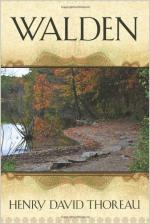|
|
Walden The Pond in Winter
Thoreau begins this chapter awakening with a question put to him in the night, which was answered when he awoke again at dawn. The beauty of the light and his surroundings answers all his questions. After finding this answer, he turns to the morning work: finding water beneath a foot and a half of ice. The pond sleeps all winter like the animals, and when Thoreau cuts through the snow and ice to find the pond totally calm beneath, he finds heaven below as well as above.
Topic Tracking: Awakening for Reform 4
Many men come to fish in the morning:
"Here is one fishing for pickerel with grown perch for bait. You look into his pail and wonder as into a summer pond, as if he kept summer locked up at home, or knew where she had retreated. How, pray, did he get these in mid-winter? O, he got worms out of rotten logs since the ground froze, and so he caught them. His life passes deeper in Nature than the studies of the naturalist penetrate; himself a subject for the naturalist. The latter raises the moss and bark gently with his knife in search of insects; the former lays open logs to their core with his axe, and moss and bark fly far and wide....Such a man has come to fish, and I love to see Nature carried out in him. The perch swallows the grub-worm, the pickerel swallow the perch, and the fisherman swallows the pickerel; and so all the chinks in the scale of being are filled." The Pond in Winter, pp. 230-31
The pickerel in Walden are beautifully colored. This is especially amazing in the white winter environment of Walden.
Walden was thought to be bottomless, and remained untested, for years. During the winter, Thoreau tested it and found it to be 102 feet deep (107 since it has risen), which is uncommon, but not unreasonable. He sounded it with a rope tied to a stone. Thoreau is thankful that it is so deep and pure.
"While men believe in the infinite some ponds will be thought to be bottomless." The Pond in Winter, pg. 232
A factory owner to whom Thoreau related this information wouldn't believe it was so deep because he thought it was too steep for the sand to stay against the sides, but Thoreau thinks Walden has a cup shape, like many features of the surrounding landscape. If Walden were empty, Thoreau thinks it would look just like the surrounding meadows. He bases this on his finding that in the deepest area of the pond, it is flat for several acres. Thoreau also found that the deepest point was in the exact middle of the map. He wonders if this is a universal rule. Another rule he considers as universal is that coves all had shallow water at their mouths and deeper water inside, which knows happens in other places. He wonders if there is a formula that will solve all these questions one day.
"If we knew all the laws of Nature, we should need only one fact, or the description of one actual phenomenon, to infer all the particular results at that point. Now we know only a few laws, and our result is vitiated...by our ignorance of essential elements in the calculation. Our notions of law and harmony are commonly confined to those instances which we detect; but the harmony which results from a far greater number seemingly conflicting, but really concurring, laws, which we have not detected, is still more wonderful. The particular laws are as our points of view, as, to the traveller, a mountain outline varies with every step, and it has an infinite number of profiles, though absolutely but one form. Even when cleft or bored through it is not comprehended in its entireness." The Pond in Winter, pp. 234-35
Thoreau goes on to consider whether or not this is true in ethics as well. Do we not know a man by the length and breadth of the whole of his behaviors, and his depth by referring to the surrounding landscape? Each person has his or her own inlets - particular emotional issues with a bar across their entrance that threatens to separate and consume a person when a storm comes. Thoreau mourns that we get stuck on shore too often, and get industrialized, and therefore have no individualized currents.
Some ice cutters who come to the pond suggest to Thoreau that there might be a leach hole in the middle that probably leads to a nearby meadow. They also find ice from one area of the pond that is much thinner, which suggests that there is an undetected inlet or spring there.
The ice moves with the wind, which leads Thoreau to wonder if we could detect such movement in the earth if we had the proper instruments. He notices this when he cut holes in the ice and the water runs over them as the ice dips.
In 1846-47, a huge crew of ice cutters come to the pond for sixteen days to gather ice for sale. Because he knows that a lot of New England ice is sold in India, Thoreau gets excited about the water from Walden mingling with the sacred water of the Ganges as it melts. But, this ice never quite made it because it looked like the wrong color (green, from close up), and instead was used locally. It was so hard and thick that it didn't all melt until September 1848. From far away the ice is blue - distinct and beautiful. Thoreau believes it may be because of the air it contains. He is obviously proud of the ice that comes from Walden.




